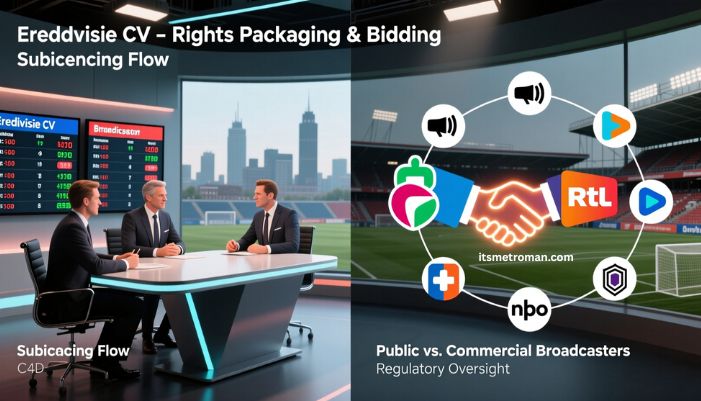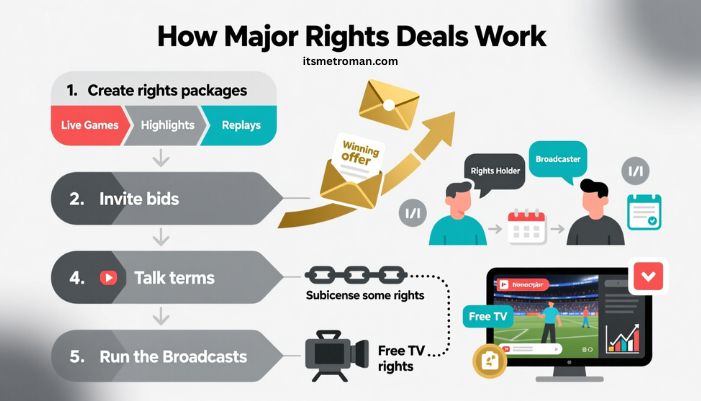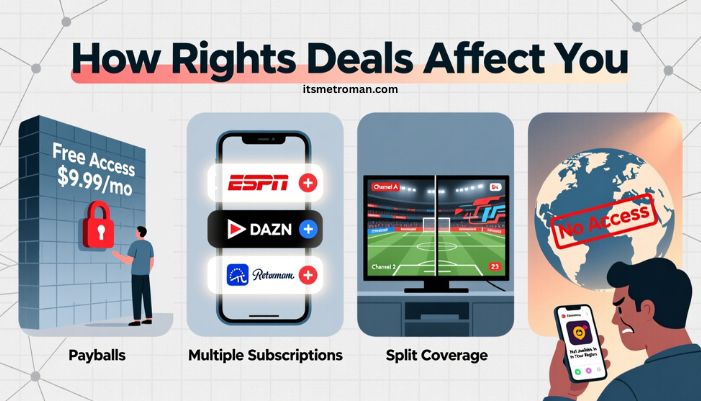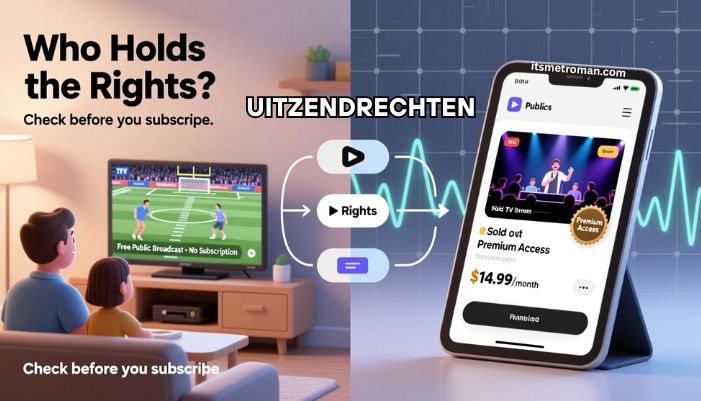Uitzendrechten is a Dutch word. It means “broadcast rights.” These rights let a TV station or a streaming service show a match, concert, or event.
If you want to watch a live football match on TV, the broadcaster must hold the correct uitzendrechten. They pay for those rights. Without them, showing the event breaks the law.
Why Uitzendrechten Matter to You
You might think: “Why should I care who holds them?”
Because those rights affect your viewing options, what you pay, and how easy it is to watch.
If one broadcaster has exclusive rights, you may need their subscription. If rights change hands, a match you watched free may move to a paid service.
In the Netherlands, ESPN holds the rights to show Eredivisie until 2030. That means many matches will appear only on ESPN channels.
When NOS (a Dutch public broadcaster) considered selling part of the World Cup 2026 rights, fans worried about access. Later, NOS decided to keep all rights themselves.
Because of such deals, your favorite events may appear in new places.
Who Trades These Broadcast Rights?

Rights deals involve several players:
- Leagues or event owners. They decide what rights to sell
- TV stations and streaming platforms. They buy those rights
- Sponsors and advertisers. They add value and help pay costs
- Government or regulators. They may set rules to protect public interests
In the Netherlands, Eredivisie CV negotiates with broadcasters. They package league rights and invite bids. Then they pick the best offer.
Sometimes a broadcaster sublicenses rights to others. For example, a public broadcaster may share match rights with commercial stations.
How Major Rights Deals Work

Here is a step‑by‑step look:
1. Create rights packages
They split rights into parts. Live games. Highlights. Replays. Each gets its own package.
2. Invite bids
Broadcasters place offers. The highest or best fit one wins.
3. Talk terms
After a winning offer, both sides discuss details. They set rules about where, when, and how the broadcast runs.
4. Sublicense some rights
The main rights holder may let others use part of the rights. For example, highlights might go to free TV.
5. Run the broadcasts
The broadcaster shows events. They monetize via ads, subscriptions, or both. They follow the contract rules.
Recent Dutch Examples
These stories show how rights deals can change your access:
- Eredivisie and ESPN: ESPN secured football rights until 2030 in the Netherlands. That shifts many matches onto its platform.
- NOS and World Cup 2026: NOS thought about selling part of its rights due to budget cuts. Later they reversed the plan and kept full control.
- European club tournaments: Ziggo got exclusive rights to Champions League, Europa League, and Conference League matches until 2027.
These cases show that contracts shift, and broadcasters must adapt or lose viewers.
How Rights Deals Affect You

Here is what changes for you:
- More paywalls. Some events move from free to paid platforms.
- Multiple subscriptions. You may need two or more platforms to catch all your events.
- Split coverage. Some parts of a league go to one station, others to another.
- Higher costs. If broadcasters pay more, that cost often passes to you.
- Regional locks. You may not get a match because your region lacks rights.
You have to keep track of where your preferred sports or events land.
Tips to Keep Up with Rights Shifts
You do not have to miss out. Try these:
- Follow the official websites of leagues
- Watch broadcasters’ news pages
- Join fan forums or social media groups
- Use services that show where events stream
- Pick a service with broad sports coverage
Before you buy a subscription, check where the content you care about is available.
Challenges in the Rights Market
The market has pressure points:
- High costs. Rights fees rise. Broadcasters may lose money if viewers drop.
- Big players dominate. Large companies push out smaller ones.
- Public access. Governments may demand certain events stay on public TV.
- Piracy. Fans sometimes use illegal streams when access is hard.
Because of these tensions, rights deals change fast.
Uitzendrechten Beyond Sports
Broadcast rights are not just about sports. They also apply to:
- Concerts
- Music festivals
- Theater shows
- National ceremonies
When you see “live on channel X” or “exclusive on platform Y,” that reflects rights negotiations behind the scenes.
What You Should Expect in 2025 to 2030
Rights deals will evolve. Here is what you can expect:
- More events move to streaming platforms
- Some free events will require payment
- Contracts will shift often
- Bundles of channels or sports packages will grow
- Public broadcasters will fight to retain key events
If you want stable access, go with broadcasters holding many rights.
Conclusion
Uitzendrechten affect what you can watch, where you can watch it, and how much it costs. They decide which broadcaster shows your favorite football match, concert, or event.
As rights deals change, some events move to paid platforms. Others stay on public TV. This means you need to keep track of who holds the rights to what.
If you care about watching live sports or big events, check where the rights are. Know which service has them. And choose your subscriptions based on what matters most to you.
FAQs About Uitzendrechten
Q: Can two broadcasters air the same match?
A: Only if one sublicenses or shares rights. Usually you get just one live broadcaster.
Q: Why did NOS keep World Cup rights after all?
A: Negotiations with buyers failed. So NOS decided to keep full rights themselves.
Q: Are rights global?
A: Not always. Rights often apply by country or region.
Q: Do streaming rights cost more?
A: Yes. Streaming platforms push up fees, and that often raises costs for viewers.
Q: How long do rights deals last?
A: Deals vary. Some last a few years. For example, the Eredivisie deal with ESPN runs until 2030.

